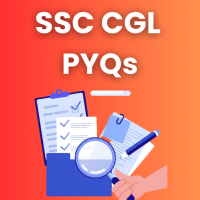SSC CGL Exam > SSC CGL Questions > Statement: The government has introduced a ne...
Start Learning for Free
Statement: The government has introduced a new tax on luxury goods.
Inference:
I. The government is trying to raise revenue.
II. The government wants to discourage the purchase of luxury goods.
III. The government wants to promote the purchase of locally made goods.
Inference:
I. The government is trying to raise revenue.
II. The government wants to discourage the purchase of luxury goods.
III. The government wants to promote the purchase of locally made goods.
- a)If only I follows
- b)If only II follows
- c)If both I and II follow
- d)If both II and III follow
Correct answer is option 'C'. Can you explain this answer?
Most Upvoted Answer
Statement: The government has introduced a new tax on luxury goods.Inf...
The statement mentions that the government has introduced a new tax on luxury goods. From this, it can be inferred that the government is trying to raise revenue through taxation. This leads to the inference that option I is correct. Furthermore, the government has introduced the tax on luxury goods, which indicates that it wants to discourage their purchase. Therefore, option II is also a possible inference from the statement. Option III is incorrect as there is no mention of the government wanting to promote the purchase of locally made goods in the statement.
Free Test
FREE
| Start Free Test |
Community Answer
Statement: The government has introduced a new tax on luxury goods.Inf...
Understanding the Inference from the Statement
The statement indicates that the government has introduced a new tax on luxury goods. Let's analyze the provided inferences to understand why option 'C' is correct.
Inference I: The government is trying to raise revenue.
- Explanation: Introducing a tax is a common method for governments to increase their revenue. Taxing luxury goods typically targets higher-income individuals, thereby generating additional funds for public services and infrastructure. This inference logically follows from the statement.
Inference II: The government wants to discourage the purchase of luxury goods.
- Explanation: Taxing luxury items can serve as a deterrent, making these goods more expensive and potentially decreasing their consumption. This inference aligns with the intent of imposing a luxury tax, aiming to reduce the demand for such products. Thus, this inference also follows from the statement.
Inference III: The government wants to promote the purchase of locally made goods.
- Explanation: The introduction of a tax on luxury goods does not inherently suggest a promotion of locally made products. There is no direct correlation between taxing luxury items and encouraging local goods. Therefore, this inference does not necessarily follow from the statement.
Conclusion
Based on this analysis:
- I and II are valid inferences that stem from the government's action of taxing luxury goods.
- III is not a valid inference as it does not logically connect to the tax's purpose.
Thus, the correct answer is option 'C', as both I and II follow logically from the statement.
The statement indicates that the government has introduced a new tax on luxury goods. Let's analyze the provided inferences to understand why option 'C' is correct.
Inference I: The government is trying to raise revenue.
- Explanation: Introducing a tax is a common method for governments to increase their revenue. Taxing luxury goods typically targets higher-income individuals, thereby generating additional funds for public services and infrastructure. This inference logically follows from the statement.
Inference II: The government wants to discourage the purchase of luxury goods.
- Explanation: Taxing luxury items can serve as a deterrent, making these goods more expensive and potentially decreasing their consumption. This inference aligns with the intent of imposing a luxury tax, aiming to reduce the demand for such products. Thus, this inference also follows from the statement.
Inference III: The government wants to promote the purchase of locally made goods.
- Explanation: The introduction of a tax on luxury goods does not inherently suggest a promotion of locally made products. There is no direct correlation between taxing luxury items and encouraging local goods. Therefore, this inference does not necessarily follow from the statement.
Conclusion
Based on this analysis:
- I and II are valid inferences that stem from the government's action of taxing luxury goods.
- III is not a valid inference as it does not logically connect to the tax's purpose.
Thus, the correct answer is option 'C', as both I and II follow logically from the statement.

|
Explore Courses for SSC CGL exam
|

|
Question Description
Statement: The government has introduced a new tax on luxury goods.Inference:I. The government is trying to raise revenue.II. The government wants to discourage the purchase of luxury goods.III. The government wants to promote the purchase of locally made goods.a)If only I followsb)If only II followsc)If both I and II followd)If both II and III followCorrect answer is option 'C'. Can you explain this answer? for SSC CGL 2025 is part of SSC CGL preparation. The Question and answers have been prepared according to the SSC CGL exam syllabus. Information about Statement: The government has introduced a new tax on luxury goods.Inference:I. The government is trying to raise revenue.II. The government wants to discourage the purchase of luxury goods.III. The government wants to promote the purchase of locally made goods.a)If only I followsb)If only II followsc)If both I and II followd)If both II and III followCorrect answer is option 'C'. Can you explain this answer? covers all topics & solutions for SSC CGL 2025 Exam. Find important definitions, questions, meanings, examples, exercises and tests below for Statement: The government has introduced a new tax on luxury goods.Inference:I. The government is trying to raise revenue.II. The government wants to discourage the purchase of luxury goods.III. The government wants to promote the purchase of locally made goods.a)If only I followsb)If only II followsc)If both I and II followd)If both II and III followCorrect answer is option 'C'. Can you explain this answer?.
Statement: The government has introduced a new tax on luxury goods.Inference:I. The government is trying to raise revenue.II. The government wants to discourage the purchase of luxury goods.III. The government wants to promote the purchase of locally made goods.a)If only I followsb)If only II followsc)If both I and II followd)If both II and III followCorrect answer is option 'C'. Can you explain this answer? for SSC CGL 2025 is part of SSC CGL preparation. The Question and answers have been prepared according to the SSC CGL exam syllabus. Information about Statement: The government has introduced a new tax on luxury goods.Inference:I. The government is trying to raise revenue.II. The government wants to discourage the purchase of luxury goods.III. The government wants to promote the purchase of locally made goods.a)If only I followsb)If only II followsc)If both I and II followd)If both II and III followCorrect answer is option 'C'. Can you explain this answer? covers all topics & solutions for SSC CGL 2025 Exam. Find important definitions, questions, meanings, examples, exercises and tests below for Statement: The government has introduced a new tax on luxury goods.Inference:I. The government is trying to raise revenue.II. The government wants to discourage the purchase of luxury goods.III. The government wants to promote the purchase of locally made goods.a)If only I followsb)If only II followsc)If both I and II followd)If both II and III followCorrect answer is option 'C'. Can you explain this answer?.
Solutions for Statement: The government has introduced a new tax on luxury goods.Inference:I. The government is trying to raise revenue.II. The government wants to discourage the purchase of luxury goods.III. The government wants to promote the purchase of locally made goods.a)If only I followsb)If only II followsc)If both I and II followd)If both II and III followCorrect answer is option 'C'. Can you explain this answer? in English & in Hindi are available as part of our courses for SSC CGL.
Download more important topics, notes, lectures and mock test series for SSC CGL Exam by signing up for free.
Here you can find the meaning of Statement: The government has introduced a new tax on luxury goods.Inference:I. The government is trying to raise revenue.II. The government wants to discourage the purchase of luxury goods.III. The government wants to promote the purchase of locally made goods.a)If only I followsb)If only II followsc)If both I and II followd)If both II and III followCorrect answer is option 'C'. Can you explain this answer? defined & explained in the simplest way possible. Besides giving the explanation of
Statement: The government has introduced a new tax on luxury goods.Inference:I. The government is trying to raise revenue.II. The government wants to discourage the purchase of luxury goods.III. The government wants to promote the purchase of locally made goods.a)If only I followsb)If only II followsc)If both I and II followd)If both II and III followCorrect answer is option 'C'. Can you explain this answer?, a detailed solution for Statement: The government has introduced a new tax on luxury goods.Inference:I. The government is trying to raise revenue.II. The government wants to discourage the purchase of luxury goods.III. The government wants to promote the purchase of locally made goods.a)If only I followsb)If only II followsc)If both I and II followd)If both II and III followCorrect answer is option 'C'. Can you explain this answer? has been provided alongside types of Statement: The government has introduced a new tax on luxury goods.Inference:I. The government is trying to raise revenue.II. The government wants to discourage the purchase of luxury goods.III. The government wants to promote the purchase of locally made goods.a)If only I followsb)If only II followsc)If both I and II followd)If both II and III followCorrect answer is option 'C'. Can you explain this answer? theory, EduRev gives you an
ample number of questions to practice Statement: The government has introduced a new tax on luxury goods.Inference:I. The government is trying to raise revenue.II. The government wants to discourage the purchase of luxury goods.III. The government wants to promote the purchase of locally made goods.a)If only I followsb)If only II followsc)If both I and II followd)If both II and III followCorrect answer is option 'C'. Can you explain this answer? tests, examples and also practice SSC CGL tests.

|
Explore Courses for SSC CGL exam
|

|
Signup for Free!
Signup to see your scores go up within 7 days! Learn & Practice with 1000+ FREE Notes, Videos & Tests.























